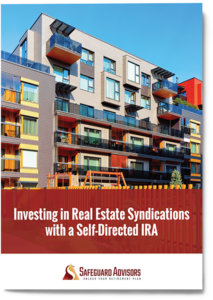Syndication Diligence: Evaluating a Sponsor
 Real estate syndications are a very popular choice for investors with self-directed IRA and Solo 401(k) plans. There are many reasons that syndications are well suited to retirement plan investing, as they are passive in nature, provide diversification, and do not produce liability exposure. A well-run syndication can also be a very good investment when it comes to return on investment for your tax-sheltered retirement savings.
Real estate syndications are a very popular choice for investors with self-directed IRA and Solo 401(k) plans. There are many reasons that syndications are well suited to retirement plan investing, as they are passive in nature, provide diversification, and do not produce liability exposure. A well-run syndication can also be a very good investment when it comes to return on investment for your tax-sheltered retirement savings.
As with so many of the great alternative asset opportunities that are available to a self-directed IRA, the key is finding the right deal to invest in. A professionally run project in a good market with the right property and financing can produce solid returns. If one or more key pieces is not executed properly, the investment can be lackluster, or worse.
We are going to dedicate a few articles to performing diligence on real estate syndications, focusing on the sponsor, the property, and the financial terms. Let us start with probably the most important piece, which is selecting the right syndication sponsor.
Syndications Come in Many Flavors
Any larger real estate project can be funded by bringing together multiple investors. You can have 5 investors partner to purchase a small apartment with 6-10 units, or 50 investors on a 300-door community. Property types range from multifamily residential to commercial retail and office space, storage facilities, and industrial properties.
The diligence necessary to join a few of your professional associates or golfing buddies on a partnership is quite different than evaluating a professional syndication sponsor on a deal where your IRA or Solo 401(k) will simply be one of many limited partners with little operational control.
We are going to focus on syndications where there is a true sponsor running the deal as a general partner, and your plan investment will be as a limited partner.
Experience Matters
I’m sorry, but if Frank is a software sales executive who just finished a 3-day syndication bootcamp and is putting together his first deal, Frank is probably not getting my IRA money as an investor. Even if I know and trust Frank, I’m just not putting my retirement savings at risk with an inexperienced player.
Real Estate syndications are a complex environment, and only experience can teach one how to properly hold together the various pieces of the puzzle.
A good syndication sponsor should have several deals that have been successfully executed to completion or are at least well along their life cycle and performing as projected. Historical performance is never a guarantee of future success, but the ability to achieve success is a strong positive indicator.
Gauging experience can take place on many levels:
- What is the professional background of the leadership team? Does it align with real estate syndications in areas of real estate acquisition and finance, legal, tax and securities regulations, and construction management, property management, etc.?
- How many deals has the sponsor executed?
- How many deals of this particular type has the sponsor executed? Success in multifamily residential does not necessarily equate to expertise in commercial office space.
- How many deals has the sponsor done in the target real estate market, and how familiar are they (or an underlying team player) with the market?
- If a team involves multiple players for acquisition, construction and maintenance , property management, and other services, have they worked together as a team in the past?
Property Acquisition & Finance
The old adage that you make money when you buy in real estate holds true in larger deals that are commonly syndicated.
As part of evaluating a deal sponsor, you should look into the type of team they have in place and the methodology they use to identify, acquire, and finance property.
In some cases, the key focus and expertise of a syndicator is real estate acquisition. Other times, they may have more of a team building, operations, or asset manager focus, and work with an in-market realtor to find deals.
The focus of the principal is not always critical here, so long as they fully understand how to buy right and have the resources to properly put together the acquisition phase of a project.
Local market expertise is crucial. Just because someone can pull off a successful project in Dallas does not mean they can get it right in Des Moines. So much of what makes most syndications successful is properly identifying the opportunity to purchase at a good price where there is potential to add value. Understanding the economic and demographic trending in a location, as well as what other similar properties are available to potential tenants is a key skill that must be present on the project team.
Part of buying right is utilizing appropriate financing. A good sponsor will have solid relationships with lenders and the kind of track record necessary to obtain favorable lending terms for the project.
Tax & Legal Matters
Real estate syndications are a form of security. At a certain level, the syndication sponsor is acting as an asset manager. When evaluating an opportunity to invest, it is important to gauge the ability of the sponsor to properly navigate the legal and regulatory framework in which they are operating.
There are several questions you can ask in this area that should help you to determine whether a sponsor knows what they are doing on the tax and legal front.
What CPA firm are they working with?
What legal counsel are they working with?
In both cases, a team that has specific expertise in the securities and reporting issues that apply to syndications should be on board.
Ask if they will be performing a cost-segregation study. While the benefits of accelerated depreciation to not apply to retirement plan investors, most any large project will benefit from this strategy and a smart sponsor will be conversant in this area. Give them bonus points if they understand and disclose to you that accelerated deprecation will not apply to your retirement plan. Most sponsors are not aware of this.
Ask questions about what kind of financial communications you can expect and the timing of when reporting will take place. Confirm these details with references if possible. As an investor, you should receive regular and prompt performance reporting and delivery of end of year tax documents such as IRS form K-1.
Ask what happens if the sponsor dies or is incapacitated, so you can determine if a viable succession plan is in place.
IRA Specific Questions
A sophisticated and experienced investment sponsor will be familiar with the special concerns that face retirement plan investors in their deal.
As you are evaluating a project, be sure to mention that you are considering investing with IRA or 401(k) funds. Rather than ask a lot of leading questions, see if they respond from a point of knowledge. An educated sponsor should know that an IRA is exposed to taxation on leveraged income, which most syndications produce, and that a Solo 401(k) is not. They should also know that the accelerated depreciation that can be produced by cost segregation does not apply to an IRA investor.
You don’t need to expect the sponsor themselves to be an expert in self-directed retirement plans, but they should have a working knowledge, and players on their team who are well versed in the implications of attracting IRA money to their deal.
The private placement memorandum should have clear language related to special considerations for IRA and 401(k) investors, and disclosures about the potential for a deal to create Unrelated Business Taxable Income or Unrelated Debt-Financed Income.
The best syndicators will have a referral to a CPA who can assist with preparation of IRS form 990-T for IRA investors subject to UDFI.
We’ve seen a good number of syndicators who only know they want to attract IRA money, but not have educated themselves in this area. They tend to be good at making incorrect statements as a result. This lack of sophistication is a real red flag.
References
You should definitely take the time to seek out references and speak with them. Don’t just focus on the one or two happy campers the sponsor is likely to hand over to you, however. Ask to speak with the least satisfied investor on a previous deal.
If you can, search out vendors that have worked with the syndication team in the past and see what they have to say about how they do business. Are they fair and reasonable in their expectations? Do they pay their bills on time? Do they ask partners to cut corners? You can learn a lot from these types of inquiries.
Background Checks
Before you hand over a significant sum of money to any investment provider, you owe it to yourself to run a background check.
Trust and Communication
With real estate syndications, you are ultimately investing in the project team. As a limited partner investor, you will have little input or control over the actual property investment.
You want to be sure the project sponsor will protect your capital, produce good results, and be transparent with investors throughout the life of the project.
Taking the time to get beyond general marketing presentations and learn about how the team is constructed, what their experience is, and how well they communicate is really the most important step in your evaluation process.
Download our Free Multifamily Syndication Guide
 If you want to learn more about Multifamily Real Estate Syndications and how they can be a great way to invest with your self-directed IRA or Solo 401(k), please download our free guide.
If you want to learn more about Multifamily Real Estate Syndications and how they can be a great way to invest with your self-directed IRA or Solo 401(k), please download our free guide.
Talk to An Expert Today!
Learn these little known strategies and tactics, and unlock your retirement plan today.
